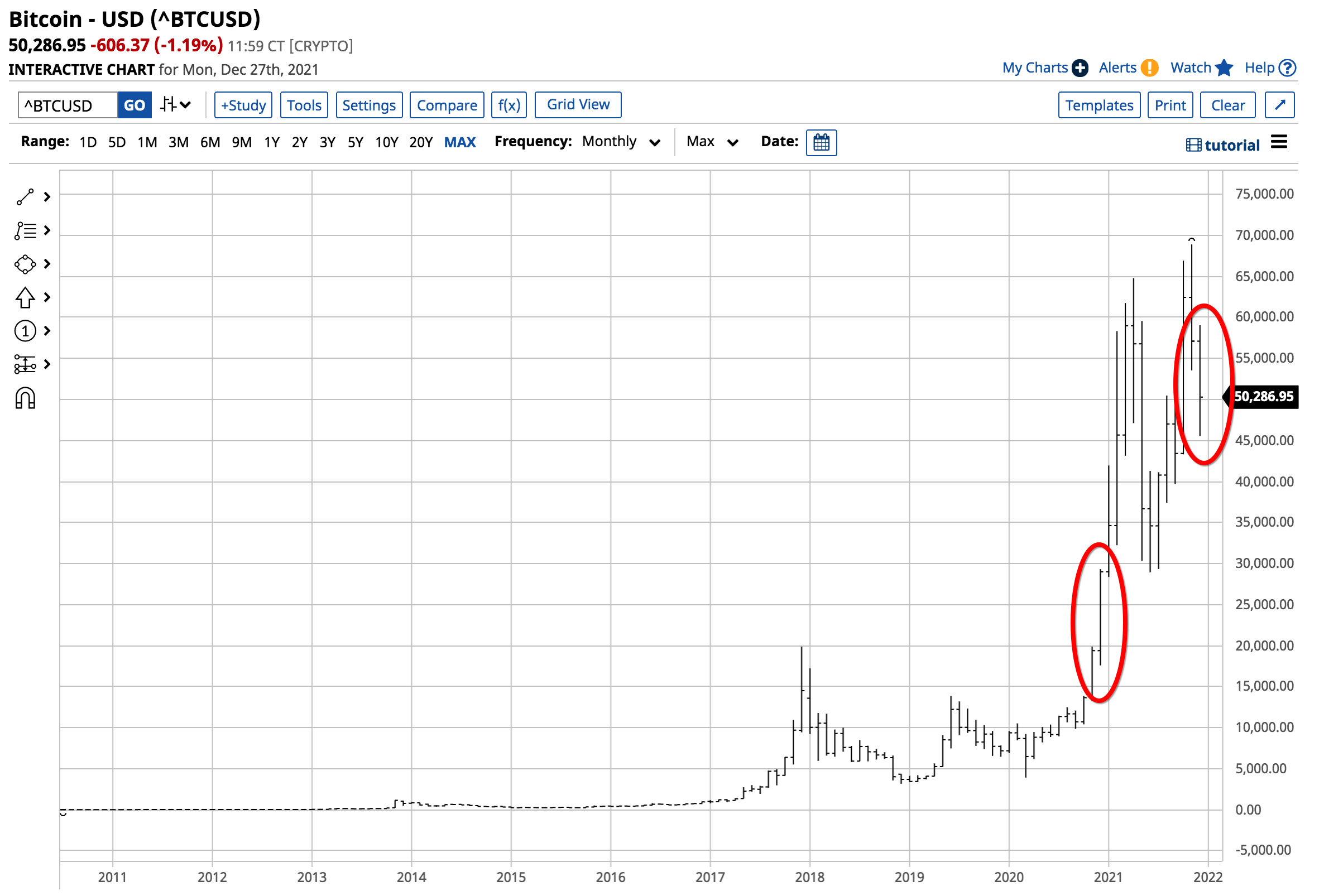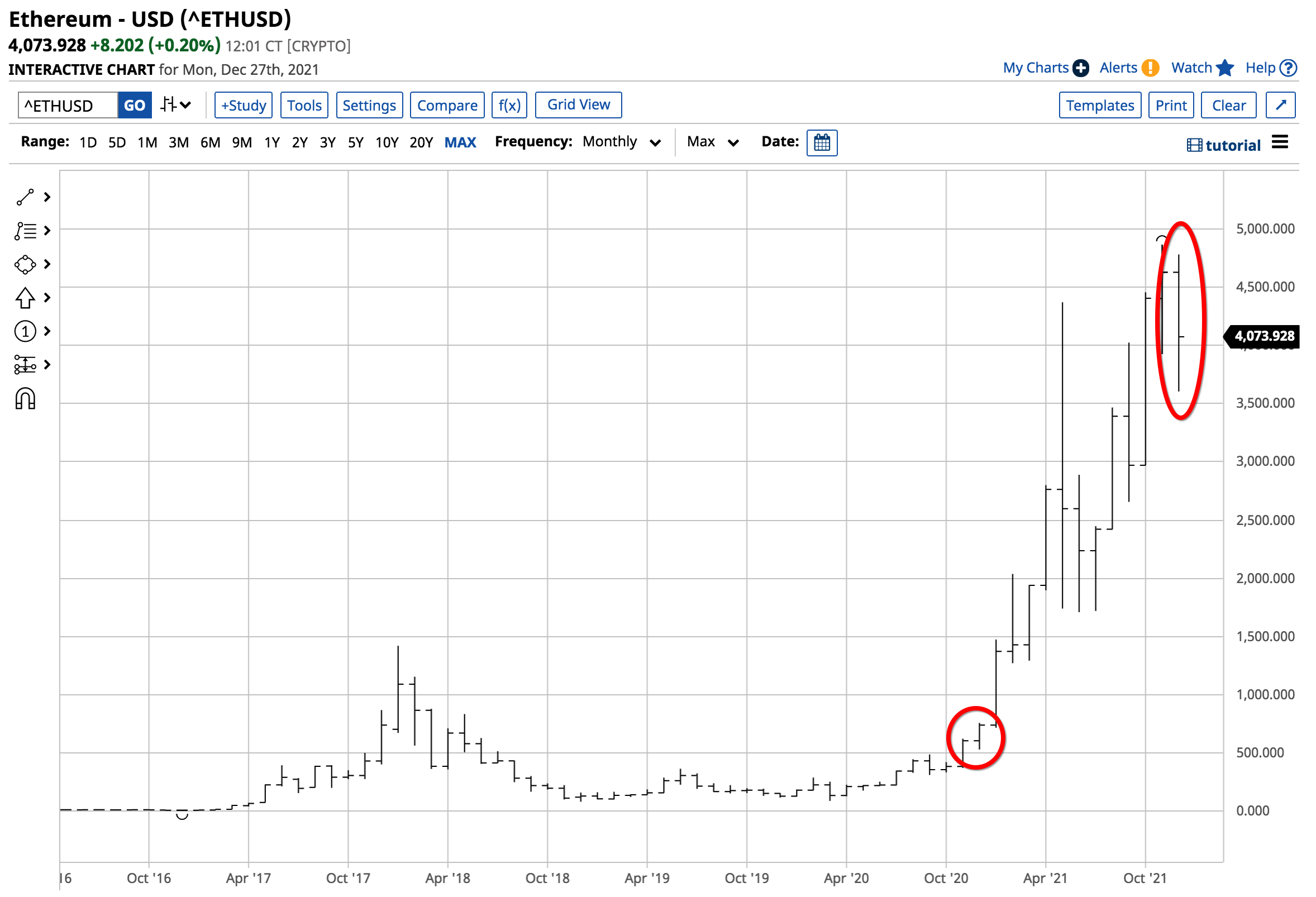LAST CHANCE - Get InvestingPro for UP TO 55% OFF before the sale ends
This article was written exclusively for Investing.com
- A winning year though Ethereum did a lot better
- Custody is critical
- Security poses threats
- Control: the leading issue for governments
- Cryptos are here to stay, but it could be a bumpy ride
At the end of last week, nearby Bitcoin futures were trading at over the $50,000 level, with the Ethereum futures contract at above $4,000 with only one week to go in this year. While the prices have come down from the Nov. 10 record highs, anyone who owned the leading cryptocurrencies on Dec. 31, 2020, and held them throughout the year has made impressive returns.
A little over a decade ago, there was no such thing as cryptocurrency. The evolution of this technological, as well as financial, revolution gave birth to blockchain and cryptos. In what turned out to be an almost perfect bullish storm, the declining faith in fiat currencies caused a growing number of individuals and businesses to accept cryptos and reject fiats.
The bullish price action in cryptos has fueled a speculative frenzy in the burgeoning asset class. While some embrace digital currencies for ideological reasons, many are showering them with love because of their price volatility and bullish trends over the past years. Rising price is a powerful and magnetic force that has added to the allure of cryptocurrencies.
The asset class is now closing the books in 2021, and devotees believe it will continue to grow in 2022. Detractors think the coming year will spell the end of the currencies that fly below or above the radar of regulators and government officials. The asset class as a whole faces a host of issues as we head into next year.
A winning year though Ethereum did a lot better
Anyone holding Bitcoin or Ethereum tokens on Dec. 31, 2020, without trading or selling them during 2021 had the value of their computer wallets bulge this past year YTD.

Source: Barchart
The chart illustrates Bitcoin’s rise from $28,986.74 on Dec. 31, 2020, to $50,818 on Dec. 27, 2021, a more than 75% move to the upside in 2021 with only a few days left in the year.

Source: Barchart
Ethereum did even better, rising from $738.912 at the end of 2020 to $4,060 on Dec. 27, 2021. The second-leading cryptocurrency provided investors with an over 449% return with just one week to go in 2021.
Ethereum far outperformed Bitcoin in 2021 as its protocol is faster and more efficient. While Bitcoin is a cryptocurrency and a means of exchange, Ethereum is a protocol that supports many other of the over 16,000 cryptocurrencies. Moreover, Ethereum 2.0 will be a far greener token as its 2.0 version’s proof of stake will require far less energy than Bitcoin’s proof of work design.
As we head into 2022, several factors are likely to cause continued volatility in the cryptocurrency asset class.
1. Custody is critical
Holding cryptocurrencies in computer wallets is no problem for the asset class’s devotees, but that is not the case for the much larger potential addressable market. Horror stories about the loss of millions and billions of dollars worth of cryptos when hard drives were discarded, or passwords were lost have prevented many market participants from opening computer wallets.
In late 2021, Jack Dorsey stepped aside as CEO of Twitter to concentrate on his payments company, formerly known as Square. Mr. Dorsey has been a vocal proponent of cryptocurrencies, saying the asset class will “unite the world.”
He changed Square’s name to Block (NYSE:SQ) in a sign that cryptos will dominate the future of payments. Block is obviously a reference to the blockchain. Mr. Dorsey’s company is working on a hard computer wallet to solve the crypto custody issue. Custody is a key factor for the success of the asset class in the opinion of market participants and regulators.
During 2021, the SEC approved Bitcoin ETF products based on futures prices as the CFTC has a handle on regulating the futures arena. However, the SEC has not approved any physical cryptocurrency ETF products. Improving the custody issue would go a long way with the regulators.
Moreover, the FDIC insures dollar deposits in financial institutions. A system of insured crypto deposits would dramatically increase the addressable market. Many market participants are looking to diversify portfolios with some exposure to cryptos. When financial institutions provide their customers with custody solutions, we will see the asset class grow.
2. Security poses threats
Computer hacks have been problematic in 2021. The Colonial Pipeline and JBS meatpacking hacks were two of many events that put a spotlight on security. The fear of losing cryptocurrencies to hackers that find their way into computer wallets or exchanges that hold tokens for many customers has been a roadblock for lots of potential market participants.
Security is another issue that the asset class faces in 2022. A significant crypto hack could send prices substantially lower over the coming months and years.
Solving the issue of safety and security involves cooperation between the exchanges and government agencies that keep tabs on hackers in order to develop robust methods of preventing token theft.
3. Control: the leading issue for governments
Custody and security are significant issues, but they are technical. Control is ideological. Worldwide governments derive power from their military and from controlling the purse strings. Governments can expand and contract the money supply to their hearts' content in order to achieve a political agenda.
The US Treasury Secretary Janet Yellen and the ECB President Christine Lagarde have both cautioned about the nefarious uses of cryptocurrencies. US Senator Elizabeth Warren recently said she wants to see increased regulation of the cryptocurrency asset class as its growth could pose “systemic risks” to the global financial system. Other government officials have made similar comments, and China banned cryptocurrencies outright in 2021.
Meanwhile, government regulators are likely far more concerned with losing control of the money supply than any other issue.
Cryptocurrencies are a libertarian means of exchange that take the power of the value of money from governments and return it to a collective of individuals that establish prices based on buying and selling in the marketplace. The ideological divide may be the most challenging to overcome in 2022 and beyond. Expect government concerns to rise with the asset class’s market cap.
Cryptos are here to stay, but it could be a bumpy ride
At the $2.38 trillion level at the end of last week, the cryptocurrency market cap is over three times higher than at the end of 2020. In 2020, the market cap moved nearly four times higher than at the end of 2019. In 2019, it moved over 1.5 times higher than at the end of 2018.
If the asset class’s market cap doubles in 2022, it will be near the $5 trillion level. The higher it climbs, the greater the odds of a significant decline triggering systemic impacts that ripple through markets across all asset classes. Expect government officials and regulators to sound alarm bells if the growth rate continues.
Meanwhile, the world has embraced blockchain and fintech. The rise of cryptocurrency prices is a call to action for governments to issue digital currencies. At the end of 2021, China seems to be in the lead, and the US, home of the world’s reserve currency, is far behind.
The more businesses and individuals embrace cryptos, the more pressure on governments and regulators to put a leash on the asset class. I believe that the breaking point can be quantified. It's a function of the asset class’s value. At over $5 trillion, panic could cause a sudden reaction.
I am bullish on cryptos as we head into 2022. I could see Bitcoin rising to the $100,000 level or higher. However, as Ray Dalio pointed out, governments have the power to “kill” the asset class.
Therefore, I'm going into 2022 with my eyes wide open, expecting incredible volatility to continue. I will only invest capital that I understand is 100% at risk in the asset class.
I would not call the ascent of cryptocurrencies a bubble; I characterize it as a threat to the status quo of the government’s control of the money supply and the traditional banking and financing hierarchy. The ideological roadblocks could create a bumpy ride for the asset class.
